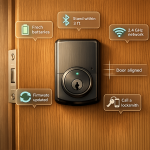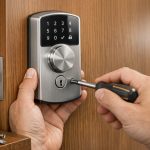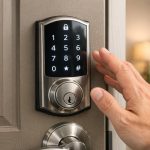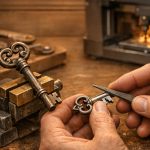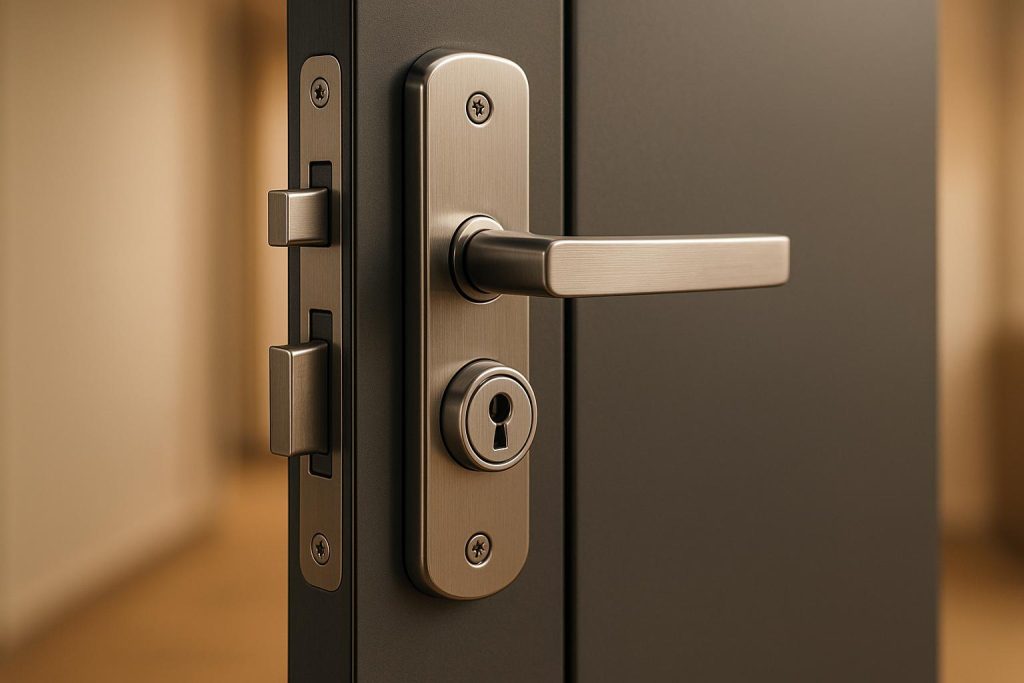When upgrading to high-security locks, expect to pay $200–$800 per lock, including hardware and professional installation. Here’s a quick breakdown:
- Hardware Costs: $100–$500 per lock, depending on features like drill resistance, pick resistance, or smart technology.
- Installation Fees: $150–$300 per lock, influenced by labor rates and door complexity.
- Additional Costs: Strike plates ($10–$60), smart lock subscriptions ($3–$10/month), and door modifications ($50–$150).
Key factors affecting pricing include the type of lock, door material, and whether you choose professional or DIY installation. Professional installation ensures proper setup and often includes warranty coverage, while DIY can save money but may risk improper alignment.
For those on a budget, focus on securing main entry points first, choose trusted brands with warranties, and consider consulting a locksmith to prioritize upgrades effectively. High-security locks are a worthwhile investment for better home protection.
$30 Deadbolt Vs $200 Deadbolt Lock
High-Security Lock Costs Breakdown
When it comes to high-security locks, the total cost depends on a mix of factors, including the hardware itself, installation, and any additional features or services. Here’s a closer look at what you might expect to spend.
Hardware Costs
The price of high-security locks varies widely based on the type and features:
- High-Security Deadbolts: These cost between $200 and $500, with premium options priced even higher. Factors like security certifications, brand reputation, and features such as drill resistance or pick-resistant pins influence the cost.
- Mortise Locks: These range from $100 to $250 but often require more complex installation due to their design.
- Keypad Locks: For keyless access, prices fall between $80 and $250, though these lack smartphone connectivity.
- Smart High-Security Locks: Combining traditional security with advanced tech, these locks typically cost $150 to $400. Features include app connectivity, remote monitoring, and electronic access control, which drive up the price due to the sophisticated technology involved.
Choosing locks from reputable brands with warranties can provide better value, offering reliable protection against drilling, picking, and other break-in methods.
Professional Installation Costs
Hiring a professional ensures your lock is installed correctly and functions as intended, but it comes with added costs:
- Typical Installation Fees: Expect to pay $150 to $300 per lock for professional labor.
- Regional and Service Fees: In urban areas or high-cost regions, you might encounter additional charges like service call fees ($30 to $100) and travel fees ($10 to $50).
- Complex Installations: If your door requires modifications, such as drilling new holes or adjusting the frame, labor costs will increase. Emergency or after-hours services can add 25% to 50% to the total cost.
For example, in April 2025, a customer named Tiffany Katter paid $450 to Sherlock’s Locksmith for unlocking a door, removing a broken lock, and installing a new doorknob and lock. This demonstrates how costs can vary depending on the work involved.
Additional Costs to Consider
Beyond the hardware and installation, there are other expenses to keep in mind:
- Reinforced Strike Plates: Adding these can cost $10 to $60 per door for extra security.
- Smart Lock Batteries and Subscriptions: Batteries typically cost $5 to $20 per set, while subscription fees for remote access and monitoring range from $3 to $10 monthly.
- Door Preparation: Retrofitting older doors might require extra labor and materials, especially if modifications to the frame or new holes are needed.
- Security Consultations: A professional assessment to determine the best lock for your needs can cost between $50 and $200. While this adds to the initial expense, it can save money by helping you make the right choice upfront.
- Extended Warranties: Manufacturers usually offer warranties lasting one to five years, but professional installers may provide extended coverage for an additional $10 to $50 per lock, giving you added peace of mind.
What Affects High-Security Lock Pricing
When it comes to high-security locks, several factors can influence the final cost. Knowing these variables can help you plan your budget and make better decisions about safeguarding your property.
Door Type and Material
The type of door you have plays a big role in the overall cost. Wooden doors are generally easier to work with, often requiring fewer adjustments, which keeps labor costs lower. On the other hand, metal doors can bump up labor costs by an additional $50–$150 due to the need for specialized tools and reinforcements. Glass doors often require custom lock solutions, which can significantly add to the price. For older doors, modifications like drilling or reinforcing may also add $50–$150, depending on the door’s condition and age.
"Each door, whether it’s the front door, the back door, the interior door, or some other entry point, will add to the total cost." – Sherlock’s Locksmith
Lock Features and Mechanisms
The features and complexity of the lock are another major cost factor. A basic high-security deadbolt with anti-pick pins and drill resistance typically costs between $200 and $500. If you’re looking for more advanced options, like smart locks with app control or remote monitoring, expect to pay an additional $100 to $200. Biometric locks, which use fingerprint recognition, range from $300 to $700, while multi-point locking systems can add $50–$200 due to the extra hardware and complexity of installation. High-tech solutions like keyless entry or locks integrated into larger security systems will drive costs even higher. Keep in mind that local labor rates and service conditions also impact the final price.
"The cost of a lock is likely to go up the more sophisticated and secure it is." – Sherlock’s Locksmith
Labor and Location Rates
Labor costs vary widely depending on where you live. For instance, in Pittsburgh, PA, installing a high-security lock can cost anywhere from $80 to $200 per lock. Additional charges, such as travel fees ($10–$50) and service call fees ($30–$100), can further affect the total. If you need emergency or after-hours installation, expect to pay 25% to 50% more. For example, a job that would normally cost $200–$500 could increase to $250–$750 if done during evenings, weekends, or holidays. The complexity of the job – whether it’s a simple deadbolt swap or a full smart lock setup – also plays a key role in determining labor costs.
Maintenance and Long-Term Costs
Investing in high-security locks doesn’t stop at the initial purchase. Like any security system, they require care and occasional repairs to ensure they continue functioning effectively. Being aware of these long-term costs can help you plan your home security budget more accurately.
Regular Maintenance Costs
Annual maintenance for high-security locks typically costs between $50 and $150. This includes essential tasks like lubrication, cleaning, inspections, and minor adjustments. If you have smart locks, you’ll also need to factor in battery replacements, which cost around $5 to $20 every 6–12 months, along with software updates to keep the system running smoothly.
Some smart locks may also come with additional fees, which we’ll cover next.
Smart Lock Subscription Fees
For those opting for smart high-security locks, ongoing subscription fees are another consideration. These range from $5 to $20 per month and often include features like remote access, cloud storage for access logs, integration with home automation systems, and enhanced security monitoring. Many manufacturers offer discounts for annual plans, which can help lower the overall cost.
It’s worth comparing subscription features with your specific needs to avoid paying for services you won’t use.
Repair and Replacement Costs
Over time, wear and tear or unexpected issues may lead to repair or replacement expenses. Repair costs for high-security locks generally fall between $50 and $200, depending on the issue’s complexity. Common problems include jammed or misaligned lock cylinders, worn-out pins or tumblers, electronic malfunctions in smart locks, or damage from attempted break-ins.
For example, fixing a mechanical issue like a jammed lock usually costs $60 to $120, while electronic repairs for smart locks can be pricier. Minor electronic issues might cost $50 to $200, while full replacements can range from $200 to $500 or more.
Staying on top of regular maintenance can help prevent costly repairs. Annual inspections can catch small problems – like misaligned parts or early signs of tampering – before they escalate. For instance, lubricating a lock annually can prevent internal corrosion, which might otherwise require a full replacement.
Additional recurring costs to consider include:
- Key duplication: $2 to $8 per key
- Extended warranties: $10 to $50 per lock for coverage beyond the standard warranty
- Professional security inspections: $50 to $200 per visit for a comprehensive review of your security system
Many local locksmiths, like Sherlock’s Locksmith in Pittsburgh, PA, offer 24/7 mobile services for maintenance and emergency repairs. Their certified technicians can handle everything from routine upkeep to urgent fixes, ensuring your security system stays reliable when you need it most.
sbb-itb-643e28e
Budget-Friendly Options for Homeowners
Homeowners looking to improve security without overspending can achieve a lot by focusing on strategic upgrades. High-security locks don’t have to cost a fortune if you plan carefully. With smart decisions and a clear strategy, you can boost your home’s safety while keeping costs in check. Here are three practical ways to balance security and budget.
Focus on Main Entry Points First
Start by prioritizing your main entry points – like the front door, back door, and garage access. These areas are often the most vulnerable, so upgrading them first provides the most impact for your money. Instead of replacing every lock in the house, concentrate your resources on these critical spots. For ground-level windows, consider affordable reinforcement options, such as window locks or security film, to add an extra layer of protection without stretching your budget.
Select Quality Brands with Warranties
Opting for locks from trusted brands with solid warranties can save you money in the long run. Reliable manufacturers often offer products that are built to last, reducing the need for frequent repairs or replacements. A good warranty also provides peace of mind, ensuring that any issues are covered without additional expense. Investing in well-known, quality brands is a smart way to combine durability with cost-effectiveness.
Use Professional Installation Services
Although DIY installation might seem like a money-saver, hiring a professional ensures your locks are installed correctly and function as intended. Improper installation can compromise the lock’s effectiveness and even void the manufacturer’s warranty. Certified locksmiths, like Sherlock’s Locksmith in Pittsburgh, PA, offer expert services to guarantee proper installation and long-term reliability.
"When you hire Sherlock’s Locksmith, we ensure that you work with professionals who prioritize quality service and customer satisfaction. We are licensed, insured, and compliant to industry standards, so you have peace of mind knowing the job will be done reliably and to a high standard." – Sherlock’s Locksmith
Many locksmiths also provide package deals or free consultations, helping you pinpoint vulnerable areas and prioritize upgrades that deliver the most value. These tips set the stage perfectly for exploring the pros and cons of DIY versus professional installation.
DIY vs. Professional Installation Comparison
When deciding how to install high-security locks, balancing cost, time, and security is essential. Whether you choose to handle the installation yourself or hire a professional, each option comes with its own set of benefits and challenges. Here’s a closer look at the key factors – cost, time, and security effectiveness – to help you make the best choice for your home.
Cost is one of the most noticeable differences. DIY installation typically ranges from $50 to $150, covering tools and basic materials. On the other hand, professional installation costs between $150 and $300 for labor alone, excluding parts. While DIY might seem like the cheaper route, unexpected expenses, such as purchasing specialized tools, can quickly add up.
Time investment is another critical consideration. Installing a high-security lock yourself can take anywhere from 2 to 4 hours, especially if complications arise. By contrast, a professional locksmith can complete the same job in just 30 to 60 minutes, thanks to their expertise and specialized tools.
The quality of the installation also varies significantly. DIY efforts often fall short in crucial areas, such as aligning the strike plate on a deadbolt. A misaligned plate might look secure but can leave your home vulnerable to forced entry. Professionals, with their training and equipment, ensure the lock is installed correctly and thoroughly tested to minimize security risks.
Warranty coverage is another major factor to consider. DIY installations typically come with limited or no warranty, especially if errors occur during the process. Professional locksmiths, however, usually provide full warranty coverage for both parts and labor. Many even offer extended warranties for added peace of mind.
Cost and Quality Comparison Table
| Criteria | DIY Installation | Professional Installation |
|---|---|---|
| Upfront Cost | $50-$150 (tools and basic locks) | $150-$300 (installation fee) |
| Time Investment | 2-4 hours | 30-60 minutes |
| Warranty Coverage | Limited or no warranty for errors | Full warranty coverage |
| Security Effectiveness | Higher risk of improper installation | Expert setup ensures maximum safety |
| Tool Requirements | Basic tools, possibly specialized | Professional-grade tools included |
| Skill Level Needed | Moderate to advanced DIY skills | None required from homeowner |
It’s also worth noting that DIY installations can lead to hidden costs. For example, specialized tools might cost an additional $50 to $100, and mistakes could result in repairs that exceed the cost of hiring a professional. Locksmith services, like Sherlock’s Locksmith in Pittsburgh, PA, often offer transparent pricing and package deals, making professional installation a more predictable and stress-free option.
High-security locks, especially those with features like drill resistance, pick resistance, and key control mechanisms, demand precise installation to perform as intended. Professionals use advanced tools and diagnostic equipment to ensure these locks provide the maximum level of security.
If you’re confident in your DIY skills, installing standard locks might be feasible. However, for high-security locks – especially on main entry points – professional expertise is typically the better choice. The added benefits of warranty protection, time savings, and guaranteed quality often make the extra expense worthwhile.
Summary
High-security locks provide an added layer of protection through advanced features and sturdy installation, balancing upfront costs with lasting security benefits. For homeowners, the total cost typically ranges from $350 to $800 per lock, including professional installation. While this may seem like a hefty investment, it significantly boosts home security and might even qualify you for insurance discounts.
Several factors influence these costs. The type of door, the materials used, and the complexity of the lock’s features – like resistance to drilling or picking, as well as smart technology – can push prices higher. Labor costs also vary depending on where you live, with urban and high-cost areas generally charging more for installation.
There are also modest ongoing expenses to consider. For smart locks, these might include battery replacements (about $5–$20) and subscription fees (ranging from $3–$10 per month). For other high-security locks, maintenance is usually minimal, involving occasional lubrication and inspections. Examples from real-world scenarios show that costs can fluctuate depending on the complexity of the service and specific needs.
If budget is a concern, focusing on upgrading your main entry points first is often a smart move. Opting for reputable brands with solid warranties can help manage long-term expenses, and professional installation ensures the locks perform as intended while keeping warranties intact.
FAQs
Why is it better to have a professional install high-security locks instead of doing it yourself?
Choosing to have high-security locks professionally installed ensures they work as intended, minimizing the chance of vulnerabilities and keeping your home secure. Attempting a DIY installation might lead to errors that not only weaken your security but could also cost more to fix down the line.
With Sherlock’s Locksmith, you get experienced technicians who specialize in handling high-security locks with care and expertise. This means you can rest easy knowing your home is safeguarded the right way.
What features should I look for in a high-security lock to protect my home?
When selecting a high-security lock, it’s important to start by evaluating your home’s unique requirements. Think about aspects such as the crime rate in your neighborhood, the type of doors you’re securing, and whether you’d benefit from features like key control, drill-resistant mechanisms, or smart lock technology.
For tailored advice, consulting a professional locksmith can make all the difference. Experts like Sherlock’s Locksmith can assess your home’s security needs and suggest locks that offer the best level of protection. Their certified technicians can also handle the installation process, ensuring your locks are properly set up to keep your home secure.
What long-term costs or maintenance tips should homeowners know about high-security locks?
High-security locks are a solid way to protect your home, but they do require some upkeep over time. For starters, you might need to set aside a bit of your budget for occasional maintenance like lubricating the locks to keep them working smoothly or rekeying if a key goes missing. Scheduling annual maintenance checks can catch small issues before they turn into bigger problems, helping your locks last longer.
If your lock is exposed to tough weather – think extreme cold or high humidity – it might need extra attention to avoid unnecessary wear and tear. Also, always use the correct key and avoid forcing it, as that can lead to damage. With proper care, your high-security lock can stay dependable for many years.



